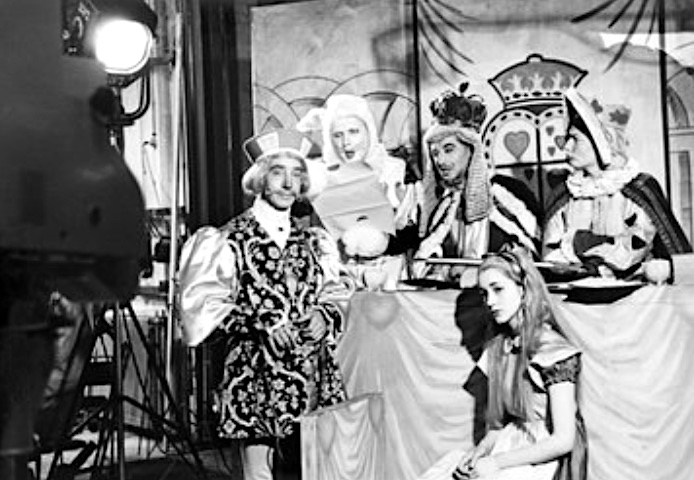OTD in early British television: 1 July 1939

John Wyver writes: Lookers-in on the evening of Saturday 1 July 1939 were treated to a 50-minute anthology of scenes from literature about the law. Compiled by Barbara Nixon and produced by Desmond Davis, this followed on from a selection of love scenes shown in January under the title of O Mistress Mine.
The earlier transmission featured scenes from Romeo and Juliet and As You Like It, Congreve’s Love for Love and John Gay’s The Beggar’s Opera, as well as J.M. Barrie’s Quality Street, Noel Coward’s Private Lives, and – perhaps somewhat incongruously, act 3 of Ibsen’s A Doll’s House.
The running order for Fiat Justitia was even more eclectic. A scene from Alice in Wonderland (illustrated above) was followed a Dogberry episode from Much Ado About Nothing, then extracts from Six Men of Dorset, a tale of the Tolpuddle Martyrs written by Miles Malleson and H. Brooks.
Following this were an A.P. Herbert tale, The Last Glass, and the melodrama Young Madame Conti by Bruno Frank Taut, which had recently been staged on Broadway [and in London – see below]. A scene from Elmer Rice’s Judgement Day preceded a return visit to Alice’s world, before Portia from The Merchant of Venice rounded things off, presumably with ‘The quality of mercy’ from act 4 scene 1.
The company was extensive and impressive, and included Barbara Nixon, Jessica Tandy, Selma Vaz Dias, Holland Bennett and Basil Cunard. Grace Wyndham Goldie was broadly supportive:
This was better acted, notably by Jessica Tandy and Arthur Young, than the earlier example in the style, O Mistress Mine. It was also more obscure and generally rather less successful. But this was probably inevitable. Justice, after all, presents more problems than courtship.
[OTD post no. 196; part of a long-running series leading up to the publication of my book Magic Rays of Light: The Early Years of Television in Britain in January 2026.]
What ambitious anthologies. Two names require more comment. One is Miles Malleson, probably best known today as the ‘dirty old man’ in the newsagent in PEEPING TOM or the Sultan in THIEF OF BAGDAD, but actually a bold and radical playwright in the 30s and 40s., whose work has recently been revived in new Yorjk and at the Jermyn St Theatre. The other is Bruno Frank (not Taut – he was an architect), a German playwright and screenwriter, whose ‘Young Madama Conti’ had also been staged at the Savoy in London. By an amazing coincidence for me, Frank was the original author of STORM IN A TEACUP, my recent Vivien Leigh/Rex Harrison discovery from 1937. He certainly needs to be added to the list of distinguished German emigres who were livening up British culture in the 30s.
Idiot me, Ian – the mistake (now corrected) comes from writing too quickly and perhaps reading too much about 20C German architecture recently. Many thanks. Remarkably, BBC West presented a television version of Six Men of Dorset in September 1962.